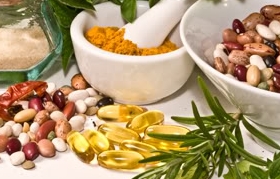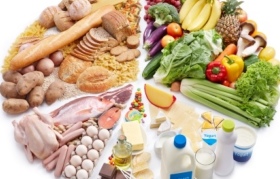Vitamins and Minerals
Vitamins were first discovered in early part of the 20th century by biochemists in Europe. As each vitamin was discovered, it was assigned a letter. We know that each vitamin has a variety of purposes and that vitamins are necessary for life. Vitamins are very different chemically and differ widely in their functions in the body.
Two distinct categories exist in the body: one of water soluble and one of fat soluble. As a rule, water soluble vitamins are absorbed into the blood and excreted in the urine without retention in the body. Fat soluble vitamins are closely related to the uptake of lipids (fats) in the body. These vitamins are stored in the body fats and amount needed and stored differ greatly depending on the vitamin.
Vitamins
Vitamins and minerals are substances that are found in the food we eat. We need vitamins so that our bodies functional properly. Each vitamin has an important role to play.
Vitamin A - Helps your eyes, health immune system and cell growth.
Vitamin D - Helps your bones.
Vitamin C - Helps your body fight inflections, forms collagen in the body, antioxidant that protects against cell damage.
B Vitamins - Help your body make protein and energy.
Vitamin E - Helps maintain your body’s tissue, helps in the formation of red blood cells; strong immunity and healthy skin and eyes.
Vitamin K - Helps in blood clotting, and prevents excessive bleeding and bone health.
Food Sources
- Vitamin A
-
Milk fortified with Vitamin A, Liver, Orange juice, cantaloupe, carrots, sweet potatoes, pumpkins, dark green leafy vegetables.
- Vitamin D (sunshine vitamin)
-
Milk fortified with Vitamin D, Fish, egg yolks, liver, fortified cereal; also formed naturally as a result of sunlight exposure.
- Vitamin C
-
Citrus fruits, cantaloupe, strawberries, tomatoes, broccoli, cabbage, kiwi fruit, and sweet red peppers.
- B Vitamins
-
Whole grain, fish, seafood, poultry, liver, eggs, dairy, leafy green vegetables, beans, and peas.
- Vitamin E
-
Whole grains, wheat germ, leafy green vegetables, sardines, egg yolks, nuts, and seeds.
- Vitamin K
-
Leafy green vegetables, dairy products, broccoli, and soybean oil.
What is the difference between water and fat soluble?
Fat soluble vitamins are stored in the fat tissues and liver until your body needs them. Some vitamins stay stored for a few days while others for up to six months. Fat soluble vitamins are A, D, E, and K.
Water soluble vitamins are not stored in the body. They travel through the bloodstream to the areas needed. What we don’t use comes out when we urinate. They have to be replaced by eating the correct things. Water soluble vitamins include: Vitamins C, B1 (Thiamin), B2 (Riboflavin), Niacin, B6 (Pyridoxine, Folic Acid, B12 (Cobalamine), Biotin, and Pantothenic Acid.
Minerals
Minerals are elements that are required for the body for several purposes. They are part of the chemical processes that occur to keep our body healthy. They work in conjunction with many other chemicals including vitamins. There are three basic groups of minerals: macro minerals which are needed in larger amounts, the micro minerals which were called trace minerals, and ultra minerals which are present but are not typically considered essential to health. Deficiency in minerals may cause significant symptoms and will precipitate imbalances in the body.
Calcium - Essential for bone growth and strength, blood clotting, muscle contraction, and the transmission of nerve signals.
Choline (Vitamin B complex) - Plays a key role in the production of cells and neurotransmitters.
Chromium - Helps control blood sugar levels.
Copper - Important in the metabolism of iron
Fiber - Helps with digestion and the maintenance of blood sugar levels; reduces the risk of heart disease.
Folic Acid - Key for the development of cells, protein metabolism and heart health; in pregnant women, helps prevent birth defects.
Iodine - Important in the production of thyroid hormones.
Iron - Key component of red blood cells and many enzymes.
Magnesium - Helps with Heart rhythm, muscle and nerve function, bone strength.
Manganese - Important in forming bones and some enzymes.
Phosphorus - Allows cells to function normally; helps the body produce energy; key in bone growth.
Potassium - Important in maintaining normal fluid balance; helps control blood pressure; reduces risk of kidney stones.
Selenium - Protects cells from damage; regulates thyroid hormone.
Sodium - Important for fluid balance.
Zinc - Supports the body’s immunity and nerve function; important in reproduction.
Minerals Found In Foods
- Calcium
-
Milk, yogurt, hard cheeses, fortified cereals, spinach
- Choline
-
Milk, liver, eggs, peanuts
- Chromium
-
Meats, poultry, fish, some cereals
- Copper
-
Seafood, nuts, seeds, wheat bran, cereals, whole grains
- Fiber
-
Bran cereals, peas, lentils, black beans, fruits, vegetables
- Folic Acid
-
Dark leafy vegetables; enriched and whole grain breads; fortified cereals
- Iodine
-
Processed foods and iodized salt
- Iron
-
Fortified cereals, beans, lentils, beef, eggs
- Magnesium
-
Green leafy vegetables, Brazil nuts, almond, soybeans, halibut
- Manganese
-
Nuts, beans and other legumes, tea, whole grains
- Vitamin K
-
Leafy green vegetables, dairy products, broccoli, and soybean oil.
- Phosphorus
-
Milk and other dairy products, peas, meat, eggs, some cereals and breads
- Potassium
-
Sweet potato, bananas, yogurt, yellowfin tuna, soybeans
- Selenium
-
Organ meats, seafood, Brazil nuts
- Sodium
-
Foods which sodium chloride (salt) has been added, like salted meats, nuts, butter, and processed foods
- Zinc
-
Red meats, some seafood, fortified cereals.
Nutrition Facts Label
Information Required
1. Calories
2. Calories from fat
3. Total fat (grams)
4. Saturated fat (grams)
5. Cholesterol (milligrams)
6. Total Carbohydrates (grams)
7. Complex carbohydrates
8. Sugars (grams)
9. Dietary Fibers (grams)
10. Protein (grams)
11. Sodium (milligrams)
12. Vitamin A (% of daily value)
13. Vitamin C (% of daily value)
14. Calcium (% of daily value)
15. Iron (% of daily value)
Fat Facts
1. Fats are solid at room temperature, while oils are liquid.
2. The main way energy is stored is in the fat from our excess food.
3. 3,500 calories equals 1 pound of body fat.
4. Foods labeled “fat free” may not be 100% fat free.
5. Fats absorb shock and insulates us.
6. Fats help us absorb fat-soluble vitamins.
7. 95% of the lipids in foods are triglycerides or phospholipids such as lecithin.
8. Animal fat, coconut and palm oil are mostly saturated.
9. Oils are mostly unsaturated fats.








